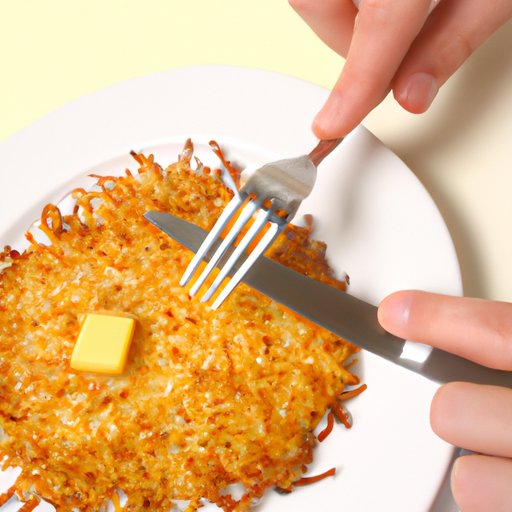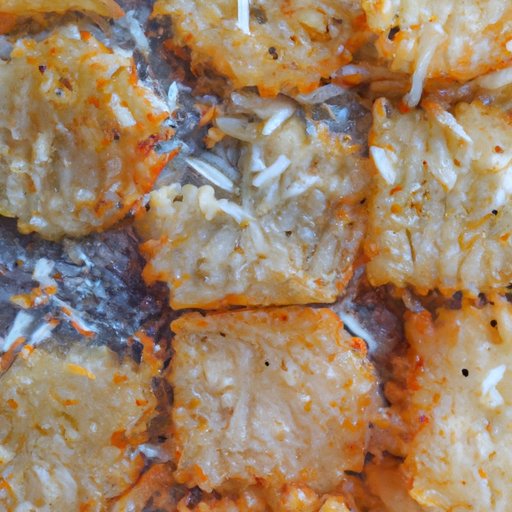Introduction
Hashbrowns are a popular breakfast food consisting of potatoes that have been shredded, formed into patties, and then fried or baked. They are commonly served alongside eggs, bacon, sausage, and other breakfast foods. While hashbrowns can be a delicious and convenient meal option, there is some debate about whether they are healthy or not. This article will explore the nutritional content of hashbrowns and their potential impact on health.
Examining the Nutritional Content of Hashbrowns and their Impact on Health
Hashbrowns are a source of carbohydrates, proteins, and fats. They also provide vitamins and minerals, such as vitamin C, iron, and potassium. The exact amount of nutrients in hashbrowns depends on how they are prepared. For example, if they are fried in oil, they will contain more fat than if they are baked. Additionally, the type of oil used to fry them can affect the nutrient content.
Potatoes are a good source of fiber, which can help keep your digestive system healthy and may help reduce cholesterol levels. Potatoes also contain B vitamins, which are important for energy production and metabolism. However, hashbrowns are typically high in calories and fat, and many varieties are also high in sodium.
Eating hashbrowns in moderation can provide some health benefits. For example, they can be a good source of energy and can help you meet your daily fiber requirements. They can also help you feel full and satisfied after a meal. However, it is important to consider the nutritional content of hashbrowns before adding them to your diet.

How to Enjoy Hashbrowns without Compromising Your Health
If you enjoy eating hashbrowns, there are ways to reduce their calorie, fat, and sodium content. One way to do this is to choose a healthier cooking method, such as baking or air-frying instead of deep-frying. Additionally, you can use a lower-fat oil or butter substitute when frying or baking. You can also opt for a smaller portion size and top your hashbrowns with vegetables or lean protein sources, such as egg whites or grilled chicken.
It is also important to read labels carefully when purchasing pre-made hashbrowns. Many store-bought varieties are higher in fat, sodium, and calories than homemade versions. Additionally, some brands add preservatives or other additives that can increase the sodium content.

Exploring Alternatives to Hashbrowns for a Healthy Diet
For those looking to limit their intake of fat and calories, there are several alternatives to hashbrowns. Sweet potatoes are a great choice, as they are high in fiber and contain fewer calories than regular potatoes. Grilled vegetables, such as zucchini or bell peppers, can also be a flavorful side dish that is lower in calories and fat than hashbrowns. Additionally, whole grain toast or oatmeal are good options for a hearty and nutritious breakfast.
Other alternatives include quinoa, bulgur, and buckwheat. These grains are high in fiber and protein and can be cooked quickly for a healthy and filling breakfast. Additionally, eggs are a great source of protein and can be cooked in a variety of ways.
The Pros and Cons of Eating Hashbrowns
When considering whether to eat hashbrowns, it is important to weigh the pros and cons. On the plus side, hashbrowns are a quick and convenient breakfast option. They can also be a good source of energy and can help you meet your daily fiber needs. Additionally, they can be a tasty addition to any meal.
On the downside, hashbrowns are typically high in calories and fat, and many varieties are also high in sodium. Additionally, they can be difficult to prepare in a healthy way, as they are often fried in oil or butter. Furthermore, eating too many hashbrowns can lead to weight gain, as they are high in calories.

Investigating the Potential Health Risks of Eating Hashbrowns
One of the main concerns about hashbrowns is their high fat content. Eating too much fat can increase your risk of heart disease and stroke. Furthermore, many varieties of hashbrowns are high in sodium, which can lead to high blood pressure, heart disease, and stroke. Additionally, eating too many hashbrowns can lead to weight gain, which can increase your risk of developing diabetes.
It is important to note that not all hashbrowns are unhealthy. Homemade versions that are cooked in a healthier way can be part of a balanced diet. Additionally, opting for lower-fat and lower-sodium varieties can help reduce the potential health risks associated with eating hashbrowns.
Conclusion
In conclusion, hashbrowns can be a tasty and convenient meal option, but they should be enjoyed in moderation. While they are a source of key nutrients, such as carbohydrates, proteins, and vitamins and minerals, they are also typically high in calories and fat, and many varieties are also high in sodium. Eating too many hashbrowns can lead to weight gain and increase your risk of developing diabetes and other health issues.
If you enjoy eating hashbrowns, there are ways to make them healthier. Choosing a healthier cooking method, such as baking or air-frying, and using lower-fat oils can help reduce the fat and calorie content. Additionally, opting for smaller portions and topping your hashbrowns with vegetables or lean proteins can help make them a healthier meal option. There are also several alternatives to hashbrowns, such as sweet potatoes, quinoa, and eggs, that can provide a nutritious and delicious breakfast.
Overall, hashbrowns can be part of a healthy diet when eaten in moderation and prepared in a healthier way. It is important to consider the nutritional content of hashbrowns and make informed decisions about what to include in your diet.
(Note: Is this article not meeting your expectations? Do you have knowledge or insights to share? Unlock new opportunities and expand your reach by joining our authors team. Click Registration to join us and share your expertise with our readers.)
